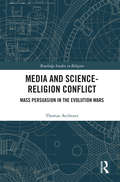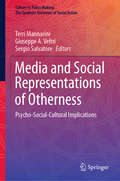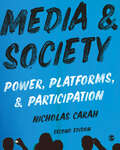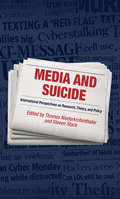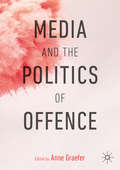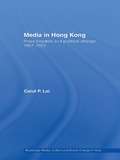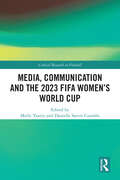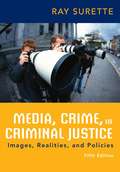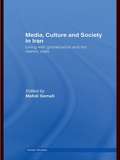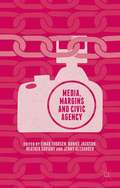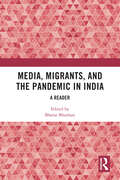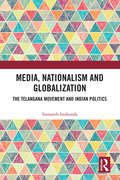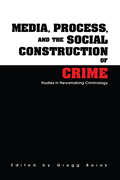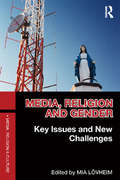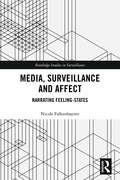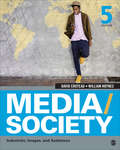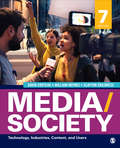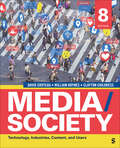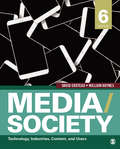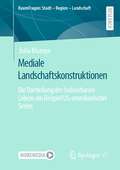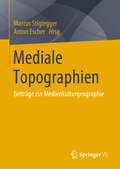- Table View
- List View
Media and Science-Religion Conflict: Mass Persuasion in the Evolution Wars (Routledge Studies in Religion)
by Thomas AechtnerThis book examines why the religion-science skirmishes known as the Evolution Wars have persisted into the 21st century. It does so by considering the influences of mass media in relation to decision-making research and the Elaboration Likelihood Model, one of the most authoritative persuasion theories. The book’s analysis concentrates on the expression of cues, or cognitive mental shortcuts, in Darwin-sceptic and counter-creationist broadcasts. A multiyear collection of media generated by the most prominent Darwin-sceptic organizations is surveyed, along with rival publications from supporters of evolutionary theory described as the pro-evolutionists. The analysed materials include works produced by Young Earth Creationist and Intelligent Design media makers, New Atheist pacesetters, as well as both agnostic and religious supporters of evolution. These cues are shown to function as subtle but effective means of shaping public opinion, including appeals to expertise, claims that ideas are being censored, and the tactical use of statistics and technical jargon. Contending that persuasive mass media is a decisive component of science-religion controversies, this book will be of keen interest to scholars of Religion, Science and Religion interactions, as well as researchers of Media and Communication Studies more generally.
Media and Social Representations of Otherness: Psycho-Social-Cultural Implications (Culture in Policy Making: The Symbolic Universes of Social Action)
by Giuseppe A. Veltri Sergio Salvatore Terri MannariniThis book presents the main findings of an empirical exploration of media discourses on social representations of “otherness” in seven European countries. It focuses on the analysis of press discourses produced over a fifteen-year period (2000–2015) on three contemporary figures of otherness that challenge the identity of European societies, question the attitudes towards diversity, and pose significant challenges for policy-makers: immigration, Islam, and LGBT. The book provides a comprehensive and articulate map of how national media addresses such themes from both synchronic and diachronic perspectives, revealing patterns of continuity and discontinuity across time and space. Lastly, it discusses these patterns in the light of their cultural meanings and their influence on social and political collective behaviours.
Media and Society: Power, Platforms, and Participation
by Nicholas CarahHow do media platforms organise social life? How do media empower or disempower our identities? How do we understand the impact of algorithms? How are media audiences produced and managed? Media & Society introduces the role of the media in social, cultural, political and economic life, unpacking the increasing entanglement of digital media technology with our everyday lives. It explores the relationship between meaning and power in an age of participatory culture, social media and digital platforms. An age where we both create and consume content, and where we both give and gain attention – translating our social lives into huge flows of data. Associate Professor Nicholas Carah shows how a critical approach to power helps us not only to understand the role media play in shaping the social, but also how we can become critically informed media citizens ourselves, able to participate and be heard in meaningful ways. Media & Society expertly introduces all the key concepts and ideas you need to know, and then puts theory into practice by tying them to contemporary case studies. From using Ghostery to track how your personal data is being collected, to exploring misinformation on social media via Youtube, to the reality of internships and freelancing in today’s digital media industry. It is essential reading for students of media, communication and cultural studies.
Media and Society: Power, Platforms, and Participation
by Nicholas CarahHow do media platforms organise social life? How do media empower or disempower our identities? How do we understand the impact of algorithms? How are media audiences produced and managed? Media & Society introduces the role of the media in social, cultural, political and economic life, unpacking the increasing entanglement of digital media technology with our everyday lives. It explores the relationship between meaning and power in an age of participatory culture, social media and digital platforms. An age where we both create and consume content, and where we both give and gain attention – translating our social lives into huge flows of data. Associate Professor Nicholas Carah shows how a critical approach to power helps us not only to understand the role media play in shaping the social, but also how we can become critically informed media citizens ourselves, able to participate and be heard in meaningful ways. Media & Society expertly introduces all the key concepts and ideas you need to know, and then puts theory into practice by tying them to contemporary case studies. From using Ghostery to track how your personal data is being collected, to exploring misinformation on social media via Youtube, to the reality of internships and freelancing in today’s digital media industry. It is essential reading for students of media, communication and cultural studies.
Media and Suicide: International Perspectives on Research, Theory, and Policy
by Thomas Niederkrotenthaler Steven StackSomewhere in the world, in the next forty seconds, a person is going to commit suicide. Globally, suicides account for 50 percent of all violent deaths among men and 71 percent for women. Despite suicide prevention programs, therapy, and pharmacological treatments, the suicide rate is either increasing or remaining high around the world. Media and Suicide holds traditional and emergent media accountable for influencing an individual’s decision to commit suicide. Global experts present research, historical analysis, theoretical disputes (including discussion on the Werther and Papageno effects), and policy regarding the media’s impact on suicide. They answer questions about the effects of different types of media and storytelling, show how the impact of social media can be diminished, discuss internet bullying, mass-shootings and mass-suicides, show the effects of recovery stories, and much more. The editors also present examples of suicide policy in the United States, Switzerland, the United Kingdom, Ireland, and Hong Kong on how to best communicate reporting guidelines to decrease the copycat effect, especially in less developed nations where most of the world’s nearly one million suicides occur each year. Although there is much work to be done to prevent media-influenced suicide, this innovative volume will contribute a large piece to this complex puzzle.
Media and the Politics of Offence
by Anne GraeferThis book explores different forms of mediated offence in the context of Trump's America, Brexit Britain, and the rise of far-right movements across the globe. In this political landscape, the so-called ‘right to offend’ is often seen as a legitimate weapon against a ‘political correctness gone mad’ that stifles ‘free speech’. Against the backdrop of these current developments, this book aims to generate a productive dialogue among scholars working in a variety of intellectual disciplines, geographical locations and methodological traditions. The contributors share a concern about the complex and ambiguous nature of offence as well as about the different ways in which this so-called ‘negative affect’ comes to matter in our everyday and socio-political lives. Through a series of instructive case studies of recent media provocations, the authors illustrate how being offended is more than an individual feeling and is, instead, closely tied to political structures and power relations.
Media in Hong Kong: Press Freedom and Political Change, 1967-2005 (Media, Culture and Social Change in Asia)
by Carol P. LaiThis book examines the Hong Kong media over a forty year period, focusing in particular on how its newspapers and TV stations have struggled for press freedom under the colonial British administration, as well as Chinese rule. Making full use of newly declassified material, extensive interviews and specific case-studies, it provides an illuminating analysis of the dynamics of political power and its relationship with media censorship. Overall, this book is an impressive discussion of the evolving face of the Hong Kong media, and is an important contribution to theoretical debates on the relationship between political power, economics, identity and journalism.
Media, Communication and the 2023 FIFA Women’s World Cup (Critical Research in Football)
by Danielle Sarver Coombs Molly YanityThis book takes a close look at the themes of media and communication in the context of the 2023 FIFA Women’s World Cup, one of the most attended women’s sporting events in history. Featuring the work of leading researchers from around the world, the book examines how the tournament was represented through traditional, digital and social forms of media, and considers how an analysis of media and communications in, around and after the tournament can help to illuminate our understanding of key themes in the study of women and sport. The book presents a series of important and fascinating cases - including media representation of Muslim women at the tournament; analysis of media reaction to USWNT results; the role of podcasts in the coverage of the tournament, and a social media analysis of sexual violence toward women athletes at the WWC – that together form a multi-layered picture of a seminal event in the history of women’s sport. This book is vital reading for anybody with an interest in women’s sport, gender and sport, the sociology of sport, media studies, communication studies, event studies or sport business and management.
Media, Crime, and Criminal Justice (5th Edition)
by Ray Surette<i>Media, Crime, and Criminal Justice</i> is the definitive text on media and criminal justice. The book features impeccable scholarship, a direct and approachable style, and an engaging format--supported by visual examples and sidebar material that complements the narrative. With the ever-increasing role of media in both reporting crime and shaping it into infotainment, the importance of the interplay between contemporary media and the criminal justice system is greater today than ever before. Author Ray Surette comprehensively surveys this interplay and showcases its impact, emphasizing that people use media-provided knowledge to construct a picture of the world and then act based on this constructed reality.
Media, Culture and Society in Iran: Living with Globalization and the Islamic State (Iranian Studies)
by Mehdi SematiBy exploring topics such as the Internet, print press, advertising, satellite television, video, rock music, literature, cinema, gender, religious intellectuals, and secularism, this unique and wide-ranging volume explains Iran as a complex society that has successfully managed to negotiate and embody the tensions of tradition and modernity, democracy and theocracy, isolation and globalization, and other such cultural-political dynamics that escape the explanatory and analytical powers of all-too-familiar binary relations. Featuring contributions from among the best-known and emerging scholars on Iranian media, culture, society, and politics, this volume uncovers how the existing perspectives on post-revolutionary Iranian society have failed to appreciate the complexity, the paradoxes and the contradictions that characterize life in contemporary Iran, resulting in a general failure to explain and to anticipate its contemporary social and political transformations.
Media, Margins and Civic Agency
by Daniel Jackson Jenny Alexander Heather Savigny Einar ThorsenThis collection brings together new research on contemporary media, politics and power. It explores ways and means through which media can and do empower or dis-empower citizens at the margins that is, how they act as vehicles of, or obstacles to, civic agency and social change.
Media, Migrants and the Pandemic in India: A Reader
by Bharat BhushanThe national lockdown to contain the COVID-19 pandemic in India resulted in the loss of work and displacement of thousands of urban migrant workers. This book records the arduous journey home for many of these workers and analyses the grave effects the pandemic has had on jobs, livelihoods, and the health of urban migrant workers. A rich compilation of deep analytical articles by journalists, academics, lawyers, and social activists, this book explores various facets of the crisis as it unfolded. It examines the welfare policies of state and central governments and discusses the role of the judiciary and the public policy response to the unemployment, health risks, and mass migration of workers. It also offers readers a better understanding of the complexities of the migrant crisis, how it unfolded, and how it was addressed by the media. This timely and prescient book will be of great interest to the general reader as well as researchers and students of media studies, journalism, sociology, law, public policy, labour and economics, welfare economics, gender studies, and development studies.
Media, Nationalism and Globalization: The Telangana Movement and Indian Politics
by Sumanth InukondaThis book explores the meanings of nationalism in a post-globalization, postcolonial context. It provides an in-depth understanding of the relationship between marginalized groups, media and politics by a focused study of the Telangana movement in India. Events like the Arab Spring, unrest in Myanmar and Ukraine, and the Brexit, Kurdish and Catalan referendums have proved how catalytic the changing media environment has been in reshaping the nature of resistance and social movements. Based on the author’s ethnographic research, this book examines how marginalized groups engage with the media and their community to participate in political processes. Analyzing public meetings, folk performances, pamphlets and media reports of the Telangana movement, the author reflects on the cultural notions of nationalism and the politics of state formation in the post-colonial context. This volume also evaluates the role of students and intellectuals in contemporary social movements and in uniting the discontents of globalization. Highlighting intersections of performativity, geography and justice, this book examines changing articulations of identity and everyday forms of resistance. It will be useful for students and research scholars interested in media and communication, cultural studies, political sciences, ethnic and minority studies and sociocultural movements in India.
Media, Process, and the Social Construction of Crime: Studies in Newsmaking Criminology (Current Issues in Criminal Justice #Vol. 10)
by Gregg BarakFirst published in 1995. Routledge is an imprint of Taylor & Francis, an informa company.
Media, Religion and Gender: Key Issues and New Challenges (Media, Religion and Culture)
by Mia LövheimMedia, Religion and Gender presents a selection of eminent current scholarship that explores the role gender plays when religion, media use and values in contemporary society interact. The book: surveys the development of research on media, religion and culture through the lens of key theoretical and methodological issues and debates within gender studies. includes case studies drawn from a variety of countries and contexts to illustrate the range of issues, theoretical perspectives and empirical material involved in current work outlines new areas and reflects on challenges for the future. Students of media, religion and gender at advanced level will find this a valuable resource, as will scholars and researchers working in this important and growing field.
Media, Surveillance and Affect: Narrating Feeling-States (Routledge Studies in Surveillance)
by Nicole FalkenhaynerSurveillance has become a part of everyday life: we are surrounded by surveillance technologies in news media, when we go down the street, in the movies, and even carry them in our own pockets in the form of smartphones. How are we constructing imaginaries of our realities and of ourselves as living in structures of control? What affects, emotions and feelings do we develop in societies of control, and how do we narrate them? Media, Surveillance and Affect represents a big step in revealing the depth of the entanglement of surveillance technology not only with our everyday lives, but with our imaginaries and affective experiences. Combining insights from affect studies with narratological and visual cultural studies approaches, the case studies in this book focus on how surveillance cameras and surveillance camera images have been used to narrate affective stories of Great Britain. Cases discussed include the memory work surrounding the murder of James Bulger in 1993 and of Lee Rigby in 2011, but also novels and artworks. With a multidisciplinary approach Media, Surveillance and Affect will appeal to students, scholars and specialists interested in fields such as media and cultural studies, literary studies, cultural sociology and surveillance studies.
Media/Society: Industries, Images, and Audiences
by Dr David R. Croteau William D. HoynesMedia/Society: Industries, Images, and Audiences, Fifth Edition, by David Croteau and William Hoynes provides a framework for understanding the relationship between media and society and helps readers develop skills for critically evaluating both conventional wisdom and their own assumptions about the social role of the media. Retaining its acclaimed sociological framework, the Fifth Edition covers new studies, includes up-to-date material about today’s rapidly changing media landscape, and significantly expands discussions of the “new media” world, including digitization, the Internet, the spread of mobile media devices, the role of user-generated content, the potential social impact of new media on society, and new media’s effect on traditional media outlets. Updated research, the latest industry data, and current examples from popular media illustrate enduring themes in the sociology of media.
Media/Society: Technology, Industries, Content, and Users
by William Hoynes Clayton Childress David R. CroteauWinner of the 2022 Textbook & Academic Authors Association′s The McGuffey Longevity Award Media/Society: Technology, Industries, Content, and Users helps students understand the relationship between media and society and gets them to think critically about recent media developments. Authors David Croteau, William Hoynes, and new co-author Clayton Childress take an interdisciplinary approach with a sociological focus to answer questions like How do people use the media in their everyday lives? and How has the evolution of technology affected the media and how we use them? The Seventh Edition incorporates the latest scholarship and data that address enduring media topics, as well as new concerns raised by the role of digital platforms, the impact of misinformation online, and the role of media during the COVID-19 pandemic.
Media/Society: Technology, Industries, Content, and Users
by William Hoynes Clayton Childress David R. CroteauWinner of the 2022 Textbook & Academic Authors Association′s The McGuffey Longevity Award Media/Society: Technology, Industries, Content, and Users helps students understand the relationship between media and society and gets them to think critically about recent media developments. Authors David Croteau, William Hoynes, and new co-author Clayton Childress take an interdisciplinary approach with a sociological focus to answer questions like How do people use the media in their everyday lives? and How has the evolution of technology affected the media and how we use them? The Seventh Edition incorporates the latest scholarship and data that address enduring media topics, as well as new concerns raised by the role of digital platforms, the impact of misinformation online, and the role of media during the COVID-19 pandemic.
Media/Society: Technology, Industries, Content, and Users
by William Hoynes Clayton Childress David R. CroteauMedia/Society: Technology, Industries, Content, and Users provides a framework to help students understand the relationship between media and society while developing skills to critically evaluate both conventional wisdom and one’s own assumptions about the social role of media. The Eighth Edition retains its basic sociological framework but has been thoughtfully streamlined in length, while still including additional discussions of new studies and up-to-date material about a rapidly changing media landscape. With updated research, the latest industry data, and current examples from popular media, this edition helps illustrate enduring themes in the sociology of media.
Media/Society: Technology, Industries, Content, and Users
by William Hoynes Clayton Childress David R. CroteauMedia/Society: Technology, Industries, Content, and Users provides a framework to help students understand the relationship between media and society while developing skills to critically evaluate both conventional wisdom and one’s own assumptions about the social role of media. The Eighth Edition retains its basic sociological framework but has been thoughtfully streamlined in length, while still including additional discussions of new studies and up-to-date material about a rapidly changing media landscape. With updated research, the latest industry data, and current examples from popular media, this edition helps illustrate enduring themes in the sociology of media.
Media/Society: Technology, Industries, Content, and Users
by Dr David R. Croteau William D. HoynesProviding a framework for understanding the relationship between media and society, this updated Sixth Edition of Media/Society helps you develop the skills you need to critically evaluate both conventional wisdom and your own assumptions about the social role of the media. Authors David Croteau and William Hoynes retain the book’s basic sociological framework but now include additional discussions of new studies and up-to-date material on today’s rapidly changing media landscape. Now featuring streamlined content and a more engaging narrative, this edition offers expanded discussions of the “new media” world, including digitization, the internet, the spread of mobile media devices, the role of user-generated content, the potential social impact of new media on society, and new media’s effect on traditional media outlets
Media/Society: Technology, Industries, Content, and Users
by Dr David R. Croteau William D. HoynesProviding a framework for understanding the relationship between media and society, this updated Sixth Edition of Media/Society helps you develop the skills you need to critically evaluate both conventional wisdom and your own assumptions about the social role of the media. Authors David Croteau and William Hoynes retain the book’s basic sociological framework but now include additional discussions of new studies and up-to-date material on today’s rapidly changing media landscape. Now featuring streamlined content and a more engaging narrative, this edition offers expanded discussions of the “new media” world, including digitization, the internet, the spread of mobile media devices, the role of user-generated content, the potential social impact of new media on society, and new media’s effect on traditional media outlets
Mediale Landschaftskonstruktionen: Die Darstellung des (sub)urbanen Lebens am Beispiel US-amerikanischer Serien (RaumFragen: Stadt – Region – Landschaft)
by Julia KlumpeIn diesem Buch erfolgen aus sozialkonstruktivistischer Perspektive eine qualitative Repräsentationsanalyse sowie eine quantitative Rezeptionsanalyse der drei US-amerikanischen Serien Gilmore Girls, Desperate Housewives und How I Met Your Mother. Die Autorin untersucht zum einen, welchen Einfluss die in den Serien gezeigten Landschaften auf die Wahrnehmung US-amerikanischer Landschaften durch die Rezipient*innen haben und stellt zum anderen heraus, inwieweit durch die dargestellten Landschaften Idealbilder konstruiert werden. Im Zentrum der Rezeptionsanalyse steht die Korpusanalyse entsprechender Fan-Foren. Untersucht wird, wie filmische Texte, insbesondere filmische Landschaften, in populäre Diskurse eingebettet werden.
Mediale Topographien: Beiträge zur Medienkulturgeographie
by Marcus Stiglegger Anton EscherFilmwissenschaftliche Analyse und die Methodik der Kulturgeographie werden in diesem neuartig perspektivierten Band zusammengeführt, um die medialen Topographien und Raumentwürfe des narrativen Films zu erkunden. Neben definitorischen Kapiteln zu Grundbegriffen der Filmgeographie finden sich Reflexionen zu den mythischen Räumen des Films, zur medialen Konstruktion ikonischer Orte (Casablanca, Tanger) sowie über die filmische Adaption von Grenz-Räumen und Konflikten (USA/Mexiko).
